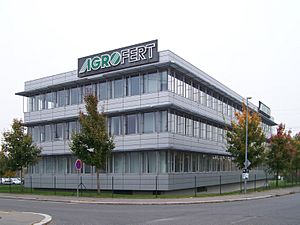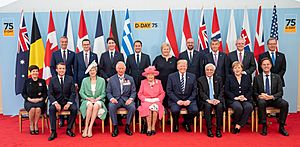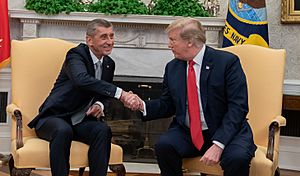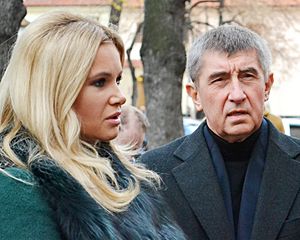Andrej Babiš facts for kids
Quick facts for kids
Andrej Babiš
|
|
|---|---|
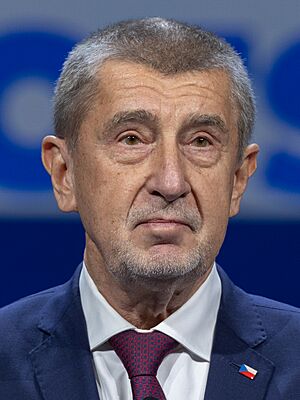
Babiš in 2025
|
|
| Prime Minister of the Czech Republic | |
| In office 6 December 2017 – 17 December 2021 |
|
| President | Miloš Zeman |
| Deputy |
|
| Preceded by | Bohuslav Sobotka |
| Succeeded by | Petr Fiala |
| Leader of ANO | |
| Assumed office 11 May 2012 |
|
| Preceded by | Position established |
| First Deputy Prime Minister of the Czech Republic | |
| In office 29 January 2014 – 24 May 2017 |
|
| Prime Minister | Bohuslav Sobotka |
| Preceded by | Jan Fischer |
| Succeeded by | Richard Brabec |
| Minister of Finance | |
| In office 29 January 2014 – 24 May 2017 |
|
| Prime Minister | Bohuslav Sobotka |
| Preceded by | Jan Fischer |
| Succeeded by | Ivan Pilný |
| Member of the Chamber of Deputies | |
| Assumed office 26 October 2013 |
|
| Constituency |
|
| Personal details | |
| Born | 2 September 1954 Bratislava, Czechoslovakia |
| Citizenship |
|
| Political party | ANO (since 2012) |
| Other political affiliations |
Communist Party of Slovakia (1980–1989) |
| Spouses | Beata Adamovičová (m. 1990, div. 2000s) Monika Herodesová
(m. 2017; separated 2024) |
| Children | 4 |
| Alma mater | University of Economics, Bratislava |
| Occupation | Businessman Politician |
| Signature | |
Andrej Babiš (born 2 September 1954) is a Czech businessman and politician. He was the Prime Minister of the Czech Republic from 2017 to 2021. Before that, he served as the Minister of Finance. Babiš is also the founder and leader of the political party ANO.
Born in Bratislava, which is now in Slovakia, Babiš became one of the richest people in the Czech Republic. He made his fortune by starting a large company called Agrofert. According to Forbes magazine, he was worth about $3.5 billion in 2024.
When he became prime minister in 2017, he was the oldest and wealthiest person to ever hold the job in the Czech Republic. He was also the first prime minister to be born outside the country and to have citizenship in two countries (Czech Republic and Slovakia).
His time as prime minister included challenges like the COVID-19 pandemic. He also had disagreements with the European Commission about his businesses. After the 2021 election, he was succeeded as prime minister by Petr Fiala.
In 2023, Babiš ran for president of the Czech Republic but lost to Petr Pavel. He continues to be an important and well-known politician in the country.
Contents
Early Life and Education
Andrej Babiš was born in Bratislava, Czechoslovakia (now Slovakia). His father was a diplomat, so Babiš spent some of his childhood in other countries like France and Switzerland.
He went to college at the University of Economics in Bratislava, where he studied international trade. After graduating in 1978, he started working for a state-owned trading company. In 1980, he joined the Communist Party of Czechoslovakia. During the 1980s, he was listed as an agent for the StB, which was the secret state security service. Babiš has said that he did not knowingly work with them.
Successful Business Career
After the Velvet Revolution in 1989, which ended communist rule, Babiš moved to the Czech Republic. In 1993, he started a company called Agrofert.
At first, Agrofert was a small trading company. But Babiš grew it into one of the largest companies in the country. Agrofert owns many businesses in farming, food production, and the chemical industry. It has companies in the Czech Republic, Slovakia, and Germany.
Later, Babiš also bought several media companies. His company MAFRA publishes two major Czech newspapers, Lidové noviny and Mladá fronta DNES. He also owns the most popular radio station, Radio Impuls. Some people worried that he had too much power because he owned both large businesses and important media outlets.
When he became Minister of Finance, he had to put his companies into a special trust. This was to avoid a "conflict of interest," which is when a person's political decisions could help their own business.
Entering Politics
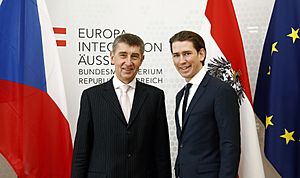
In 2011, Babiš started his own political party called ANO. He said he wanted to fight corruption and improve the country's political system.
In the 2013 elections, ANO became the second-largest party in the country. It joined a government with two other parties. Babiš became the Minister of Finance.
As finance minister, he introduced new policies. One was an electronic system for businesses to report their sales, called EET. His goal was to make sure businesses paid their taxes correctly.
Views on European Issues
During the European migrant crisis in 2015, many people were seeking refuge in Europe. The European Union created a plan for each country to accept a certain number of refugees. Babiš disagreed with this plan for the Czech Republic. He said his main job was to ensure the safety of Czech citizens.
Prime Minister of the Czech Republic
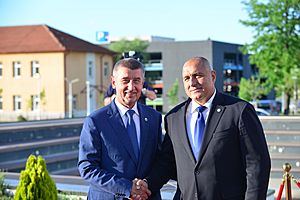
In the 2017 election, Babiš's party, ANO, won the most votes. The president asked him to form a new government. On 6 December 2017, Andrej Babiš was officially appointed Prime Minister.
It was difficult for him to form a government because many other parties did not want to join him. At first, he led a government with only members of his own party. This government did not have enough support and lost a vote in parliament.
Later, in 2018, he formed a new government with the Social Democratic Party (ČSSD). This government was supported by the Communist Party.
Key Events as Prime Minister
During his time as prime minister, several important events happened:
- Relations with Russia: His government asked over 80 Russian diplomats to leave the Czech Republic. This happened after an investigation found that Russia was involved in explosions at a warehouse in the Czech town of Vrbětice in 2014.
- COVID-19 Pandemic: His government was in charge during the global COVID-19 pandemic. It was a very challenging time that led to over 35,000 deaths in the country.
- Public Protests: Many people disagreed with Babiš and his government. Large protests took place in Prague and other cities, with some people calling for him to resign. Some of these were the biggest demonstrations in the country since the Velvet Revolution in 1989.
Visit to the United States
In March 2019, Prime Minister Babiš visited the United States and met with President Donald Trump at the White House. They talked about security, business between the two countries, and other important topics. The visit was seen as a positive step for the relationship between the Czech Republic and the USA.
After His Premiership
Babiš's party did not win the 2021 election. A new government was formed, and Petr Fiala became the new prime minister. Babiš then became the leader of the opposition in parliament.
2023 Presidential Election
In 2022, Babiš announced he would run for President of the Czech Republic. The election took place in January 2023. He was one of the top two candidates in the first round of voting.
He then faced retired army general Petr Pavel in the final round. Babiš lost the election, receiving about 42% of the vote. In his speech after the election, he congratulated Pavel and said he would continue to work for the people of the Czech Republic.
2025 Parliamentary Election
Babiš led the ANO party into the 2025 Czech parliamentary election. The party won the most seats in the Chamber of Deputies, with 34.5% of the vote.
Personal Life
Andrej Babiš has four children. He has two children, Adriana and Andrej, from his first marriage. He also has two children, Vivien and Frederik, with Monika Herodesová. He and Monika were married in 2017 but announced they had separated in 2024.
Babiš has dual citizenship, meaning he is a citizen of both the Czech Republic and Slovakia. He received his Czech citizenship in 2000. He has said that he feels Czech.
See also
 In Spanish: Andrej Babiš para niños
In Spanish: Andrej Babiš para niños
 | John T. Biggers |
 | Thomas Blackshear |
 | Mark Bradford |
 | Beverly Buchanan |


